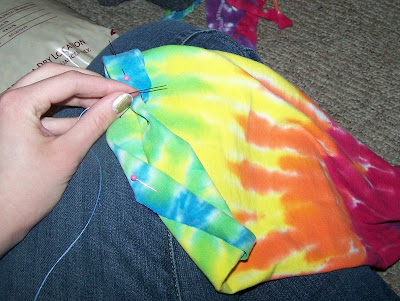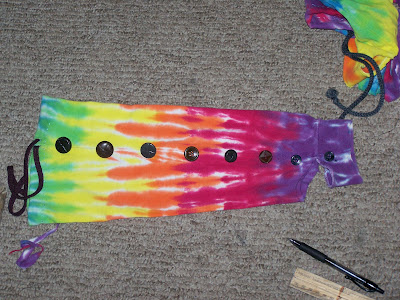So I was thinking on the subject of wealth the other day. It’s a complicated subject, really, because the way I see it, wealth doesn’t just mean how much money you have in that lovely bank account of yours. Oh, that helps, to be sure, but there’s more to it than that.
When I grew up, we didn’t have much money. My parents were teenagers when they had me, so for the first part of my life they were struggling college students trying to juggle school, work and kids, and still trying to grow up themselves. Would I say we grew up poor? It depends on who I’m talking to. Since I’m talking to you; I’ll say no. No, not exactly.
We always had enough to eat, even when it was boxed mac’n cheese again. We always had a place to live, even when it was the leaking, shitty trailer for two weeks; the one that was so small my brother and I not only shared a room, we shared a mattress. (I can hear the co-sleeping families now going "Yeah, and?" but being raised sleeping in the same bed as your siblings is one thing; abruptly having to share a bed is another. And besides, he kicked.) We even lived with my grandmother for a while, and she had two teenage boys and a husband living with her at the time. I can’t complain about that, though. Sure, the house was bitty, but us kids loved seeing our uncles every day. Knowing my grandmother as I do now, it’s my parents I feel for. But I digress. We always had a safe place to live.
We always had clothes to wear, too. Warm coats in the winter, shorts and swimsuits in the summer…we didn’t care that they usually came from goodwill, and hand-me-downs were always like Christmas, because you got a whole new bag of stuff at once, without the drudgery of following mom around through whatever store. My childhood wardrobe consisted of innumerable funky jackets, jeans, and high-topped chuck taylors--the ultimate practical uniform for exploring, climbing trees, and collecting seashells in pockets.

I knew, as I got a little older, maybe eight or nine, that we didn’t have much money. I knew that when I asked for "Either an American Girl Doll or a rag doll" for Christmas, I was going to get the one that
didn’t cost $100 (but I figured it couldn’t hurt to ask). I knew that my parents couldn’t get me new rolls of film for my camera all the time, so when I ran out, I ran out. But it didn’t really bother me, because that’s just the way life
was. Maybe it helped that most of the other kids I went to school with were usually just as poor as we were—in such a rural area, there isn’t as much pressure for name-brand clothes, or knowledge about alternative ways of living.
Many people with money say that you’re only poor if you’re lazy, that if you work your ass off, you too can be rolling in dough. Sometimes that is true. But it’s also about
priorities. My mom stopped working for a span of about eleven years, because she wanted to
raise us. She decided that bringing up her children
herself was more important than a career. She decided that the best way she could mother us was to be there all the time, so she put her life on the back burner and with support from my dad and an
amazing amount of financial finesse, she did it.
Perhaps I should say that my
parents were poor, but we, as a
family, were not. We were ‘rich in intangibles’, as my mom once put it. When I remember my childhood, I remember being happy, I remember all the things we
did, not the things we
didn’t do. We went everywhere. We hiked in parks, we went to playgrounds and beaches. We explored most of the old stone forts on the coast, found the source of the river we lived on and drove the whole length of it until we reached the ocean where it ended. We went to the state museum so often that going back now is a fond nostalgia trip as we walk among the animal displays, the quarry and the trains and the whole ‘working’ mill that runs through three stories in the center, complete with rumbling wheels and saws and the little frog in the stream at the bottom.
Sometimes we made the trip across the border and had pizza for lunch in Canada, just for the heck of it. We went to the library every week and came home loaded with books. We went to the fair every year and rode the rides and saw the horses and ate cotton candy. Most years there was apple picking, pumpkins, rides in the hay wagon. One of our favorite places to go was Norlands, a living history museum, where we explored the old houses and barns, said hello to horses and sheep and King George the pig, went to the sugar shack and saw them boiling maple sap for syrup and candy. I have been to or through most of the state, and have gone up and down it’s coast many times over the course of my life.
You may or may not have realized by now, but most of those things were free—you can do almost all of them for the cost of the car ride. My parents were rather brilliant that way. For Christmas that year, I did get the rag doll. A rag doll my mother stayed up until midnight making on Christmas eve—she bought a little cloth body, gave her dark hair like mine; freckles and button eyes. She made her a little nightgown with ribbon and lace on the hem, set her in the Christmas tree, and waited anxiously for morning. You can see how I felt about her.
Moreover, we were loved. We meant a great deal to our parents, and they never let us doubt it. So when financial difficulties came up, we still always had each other. Looking back on it, my whole childhood seems clad in jean jackets, t-shirts, and a warm, golden glow. In fact, it’s hard to concentrate on the negative parts of it at all. But for posterity, I will try.
When I was growing up, I had to change schools several times; we had to move often to be closer to the college or closer to my dad’s work. Mostly I didn’t mind, but the one time I remember being heartbroken was partway through third grade, when our landlady spontaneously gave the house to her son and said "By the way, you need to move out now." It was a college town in the middle of semester, my mother was eight or nine months pregnant, and with no warning we had no money saved. This lead to aforementioned trailer, then to an old farmhouse a mile up a lonesome dirt road, and a mile past the last bus stop for my school. We had one car, and with the schedule my dad worked, there was no possible way for my mom to get me to that bus stop every morning. I think she took it even harder than I did.
When I was in third grade and we moved, it was also a move away from my best friend of three years. When you’re eight, that’s a very long time. Luckily, our parents were determined to keep us together, and thus began the long stretch of seeing each other about four times a year. Some years more, but that was our frequent number, since we didn’t live in the same town again until she and I were twenty.
One of the worst things I remember about not having much money was this one apartment. I was nine, in the middle of fourth grade, and my parents had now both finished college. That meant we could move farther south, where there were actual jobs, and where my dad was currently working. We’d been living with my grandparents (see above) for a few months to save money, and then moved into a four –room apartment only fifteen minutes from my dad’s work. I’ll grant you, the rooms were quite large, but there were five of us. My parents took the smaller bedroom and had my then one-year-old sister in with them, and my five-year-old brother and I shared a room for the first time in years. I was quite a brat, so it was probably much harder on my brother than it was for me, but it still sucked. We lived there until just after I turned fifteen, and he turned eleven. Then my parents had saved enough money for the down payment on the house. My Dad was moving up in the factory, making the most he had yet, and we found a lovely old farmhouse in the country, surrounded by beautiful woods. My folks even bought a minivan, the first ‘new’ car they’d had in years. Then the factory was bought out and shut down, my father lost his job, and the transmission blew up on the minivan, and we were once more broke, in an old house a mile down a dirt road, and an hour away from everywhere. Yup.
I do remember my dad working this terrible schedule when I was young. He would go to work in the middle of the day and come home at one in the morning, long after we were asleep. I remember being terribly jealous of my brother, who was in kindergarten and had only a half-day of school, because he got to see my dad awake, instead of just waking him up to say goodbye in the morning. But after we’d moved into the apartment, he did start working better hours.
But that’s not really about wealth, is it? That’s about poverty. What makes me feel wealthy is not usually money in the bank. (though that is always a nice bonus). The things that make me feel safe, secure,
rich, are perhaps a little more unusual. A cellar or pantry full of bins of flour and sugar, canned goods from the garden, shelves lined up neatly and glowing with the harvest’s colors;
that makes me feel wealthy.
A shed stacked full of cordwood, dry and sheltered and ready for winter means warmth and safety and wealth to me.
The sign of wealth for me that must be most typical is my books—I have three bookshelves, my nightstand is packed with books, I have books in boxes in a closet at my mother’s house… impoverished scholar, starving artist, call me what you will. Why would I need cable when I have whole other worlds to go to for the price of lighting the lamp? The fact that I’ve gotten most of them for less than the paperback price makes me proud, not poor.
Going to my mother’s house for supper; the lights glowing gently to the dark outside, the woodstove warming the kitchen, and sitting down with those I most love to a meal my mother made—
that is wealth;
that is love and security. We are rich in intangibles, indeed.


















